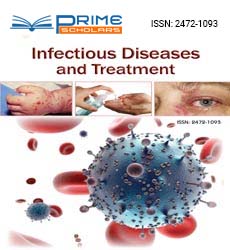Short Communication - (2024) Volume 10, Issue 4
Unveiling the Neurological Consequences of Anosmia in COVID-19 Patients
Martinez Ethan*
Department of Pathology, Crestwood University, Canada
*Correspondence:
Martinez Ethan,
Department of Pathology, Crestwood University,
Canada,
Email:
Received: 01-Apr-2024, Manuscript No. IPJIDT-24-19799;
Editor assigned: 03-Apr-2024, Pre QC No. IPJIDT-24-19799 (PQ);
Reviewed: 17-Apr-2024, QC No. IPJIDT-24-19799;
Revised: 22-Apr-2024, Manuscript No. IPJIDT-24-19799 (R);
Published:
29-Apr-2024, DOI: 10 36648/2472-1093-10.4.40
Introduction
The global spread of COVID-19 has brought to light a myriad
of symptoms and complications among which anosmia
the loss of smell stands out as a peculiar hallmark of the
disease. Beyond its role as a diagnostic indicator anosmia in
COVID-19 patients has garnered increasing attention due to its
potential implications for neurological health. Recent studies
have shed light on the behavioral functional and structural
brain alterations experienced by patients recovering from
COVID-19 who presented anosmia during their acute episode
underscoring the intricate interplay between viral infection and
the central nervous system.
Description
Anosmia often accompanied by ageusia (loss of taste) emerges
as an early and distinct symptom in a significant proportion of
COVID-19 cases. While initially perceived as a relatively benign
manifestation emerging evidence suggests that anosmia
in COVID-19 patients may signify underlying neurological
alterations with far-reaching consequences. Behavioral changes
ranging from alterations in mood and cognition to disturbances
in emotional processing have been reported among individuals
recovering from COVID-19 associated anosmia. Such alterations
may manifest as heightened anxiety depression or cognitive
deficits underscoring the broader impact of COVID-19 on
mental health. Functionally neuroimaging studies have revealed
intriguing insights into the effects of COVID-19-associated
anosmia on the brain. Functional magnetic resonance imaging
(fMRI) studies have demonstrated aberrant neural activity
within olfactory-related regions suggesting a disruption in
the central processing of olfactory information. Furthermore
alterations in functional connectivity between olfactory regions
and other brain networks implicated in cognition emotion and
memory have been observed highlighting the interconnected
nature of olfactory dysfunction with broader neural
networks. Structurally neuroimaging findings have elucidated
anatomical changes within the brain of COVID-19 patients
with anosmia. Magnetic Resonance Imaging (MRI) studies
have identified structural alterations in regions associated
with olfactory processing including the olfactory bulbs and
olfactory cortex. Additionally evidence of neuro-inflammation
and neuronal injury in regions beyond the olfactory system
has been reported suggesting a more widespread impact
of COVID-19 on brain structure. The implications of these
behavioral functional and structural brain alterations extend
beyond the acute phase of infection with potential long-term
consequences for neurological health. Persistent anosmia and
associated neurological changes may contribute to ongoing
functional impairments affecting quality of life and functional
independence in affected individuals. Furthermore the neuroinflammatory
response triggered by COVID-19 may predispose
individuals to neurodegenerative conditions or exacerbate
preexisting neurological disorders highlighting the need for
long-term monitoring and intervention strategies In light of
these findings a multidisciplinary approach to the management
of COVID-19-associated anosmia is warranted encompassing
neurological otolaryngological and psychiatric expertise. Early
detection and intervention targeting behavioral functional
and structural alterations may mitigate long-term neurological
sequelae and improve outcomes for affected individuals.
Moreover ongoing research efforts aimed at unraveling the
underlying mechanisms driving anosmia and associated
neurological changes are essential for the development of
targeted therapeutic interventions [1-4].
Conclusion
In conclusion patients recovering from COVID-19 who present
anosmia during their acute episode exhibit a spectrum
of behavioral functional and structural brain alterations
underscoring the complex interplay between viral infection and the central nervous system. Understanding the neurological
consequences of anosmia in COVID-19 patients is paramount
for guiding clinical management and improving long-term
outcomes in affected individuals.
Acknowledgement
None.
Conflict Of Interest
The author declares there is no conflict of interest in publishing
this article.
References
- Camou F, Issa N, Hessamfar M, Guisset O, Mourissoux G, et al. (2022) Is Tocilizumab plus dexamethasone associated with superinfection in critically ill covid-19 patients? J Clin Med 11:5559.
[Crossref] [Google Scholar]
- Hoetelmans RM (1999) Antiretroviral drug level monitoring: The next routine test in HIV management? Curr Opin Infect Dis 12:593-5.
[Crossref] [Google Scholar]
- Kory P, Kanne JP (2020) SARS-CoV-2 organising pneumonia: 'Has there been a widespread failure to identify and treat this prevalent condition in COVID-19?' BMJ Open Respir Res 7:e000724.
[Crossref] [Google Scholar]
- Roquilly A, Marret E, Abraham E, Asehnoune K (2015) Pneumonia prevention to decrease mortality in intensive care unit: A systematic review and meta-analysis. Clin Infect Dis 60:64-75.
[Crossref] [Google Scholar]
Citation: Ethan M (2024) Unveiling the Neurological Consequences of Anosmia in COVID-19 Patients. J Infect Dis Treat. 10:40
Copyright: © 2024 Ethan M. This is an open-access article distributed under the terms of the Creative Commons Attribution License which permits unrestricted use distribution and reproduction in any medium provided the original author and source are credited.
